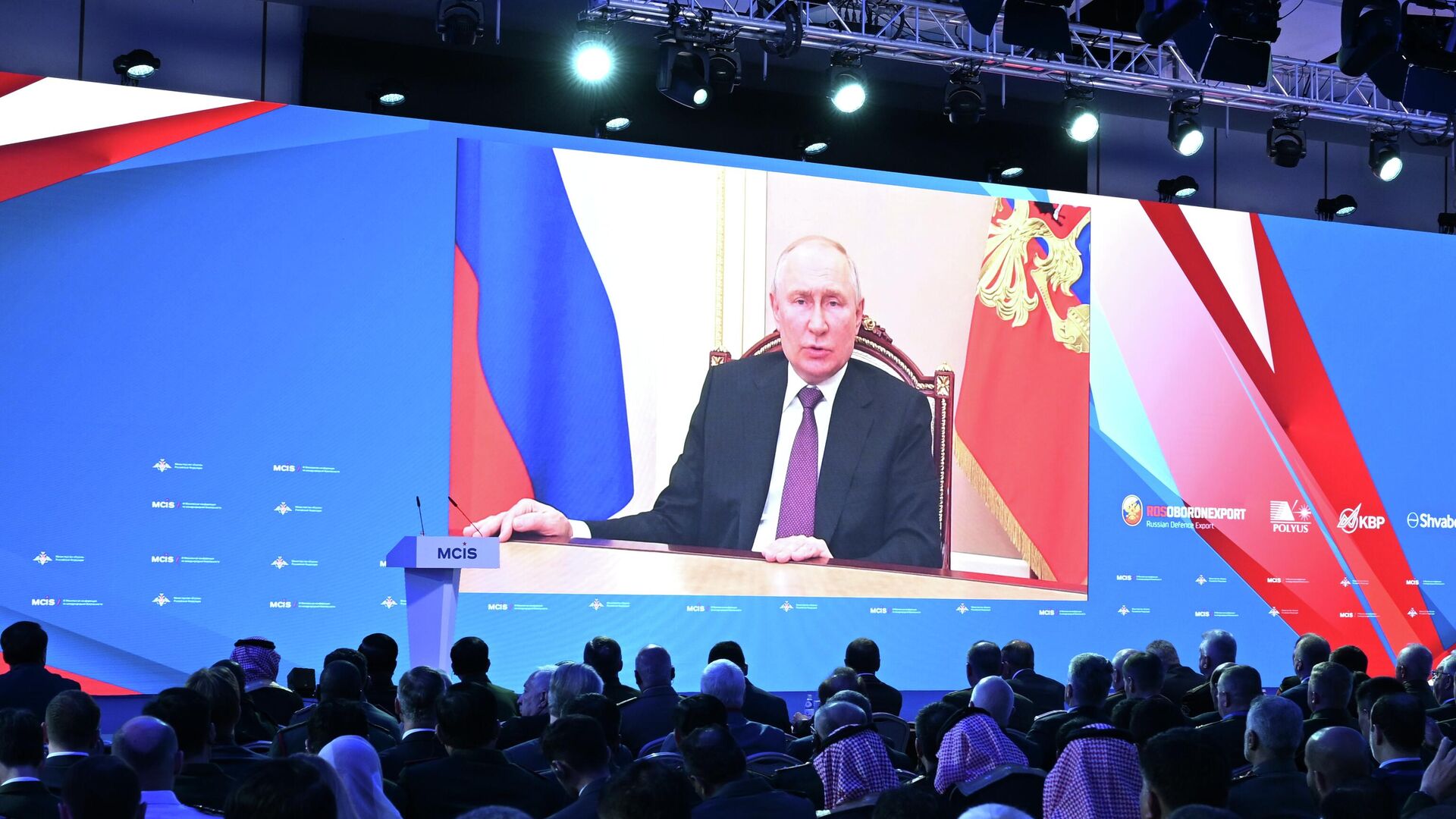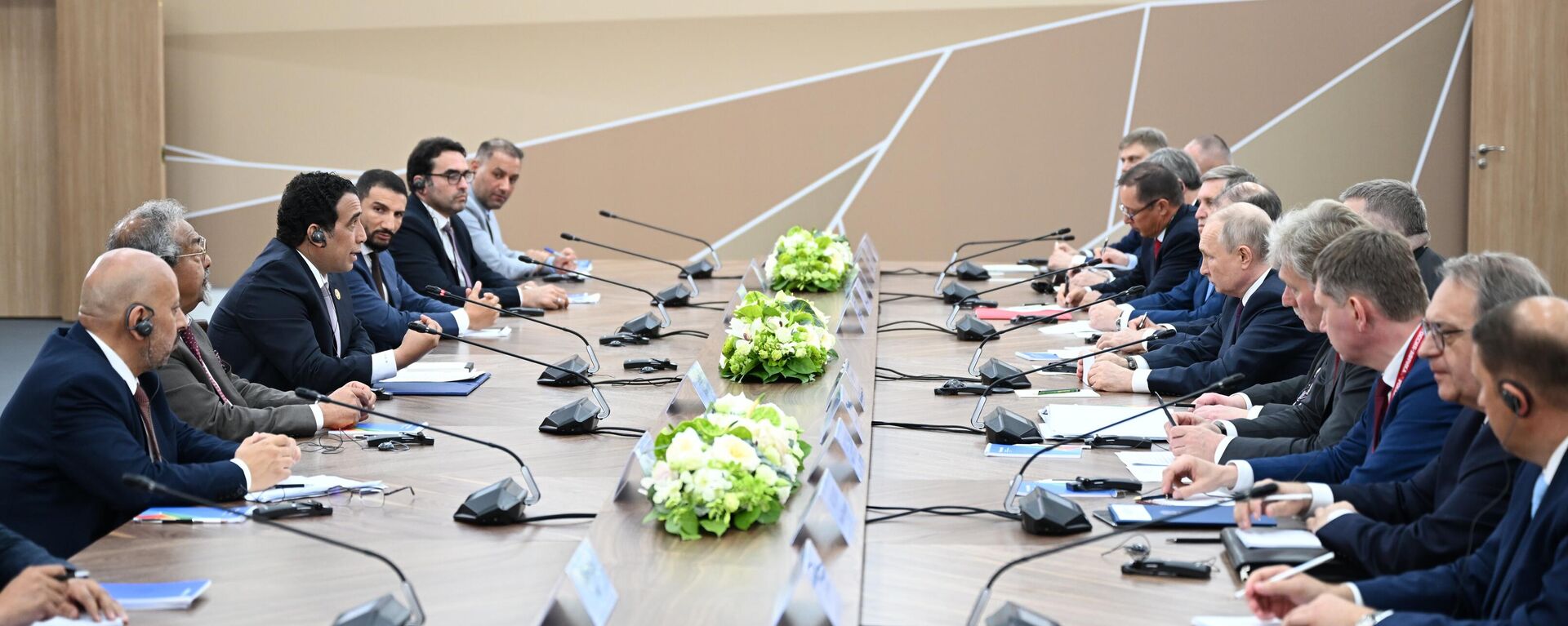https://en.sputniknews.africa/20230815/putin-blames-us-aggression-in-libya-for-putting-mali--car-under-direct-terrorist-attack-1061344313.html
Putin Blames US Aggression in Libya for Putting Mali & CAR Under Direct Terrorist Attack
Putin Blames US Aggression in Libya for Putting Mali & CAR Under Direct Terrorist Attack
Sputnik Africa
Addressing participants at the Moscow Conference on International Security (MCIS), Vladimir Putin called on the international community to unite its efforts to... 15.08.2023, Sputnik Africa
2023-08-15T11:36+0200
2023-08-15T11:36+0200
2023-08-15T11:36+0200
sub-saharan africa
russia
west africa
central africa
central african republic
mali
united states (us)
fighting terrorism
terrorism
vladimir putin
https://cdn1.img.sputniknews.africa/img/07e7/08/0f/1061345791_0:0:3074:1730_1920x0_80_0_0_121bbb9bd6e51d67f0221527fdc685e9.jpg
The West is responsible for fomenting old and new conflicts in various parts of the world, Russian President Vladimir Putin said, citing the example of terrorist activities in Mali and the Central African Republic (CAR) following US aggression in Libya.Putin attributed the continuation of existing conflicts and the emergence of new ones to what he called "geopolitical adventures" and the self-interested, neocolonial pursuits of Western powers.The Russian president cited the CAR and Mali as prime examples of countries that have fallen under the control of terrorist groups as a direct consequence of the US and its allies' aggressive actions in Libya, which ultimately led to the destabilization and disintegration of the Libyan state.By drawing attention to this cause-and-effect relationship, Putin highlights the role of Western intervention in exacerbating security problems in these African nations. He explained that the US and NATO aggression in Libya destabilized the North African country and created a security vacuum that allowed terrorist groups to spread throughout the region.Libya has been torn by more than a decade of on again-off again conflict, involving foreign powers and a myriad of militias, since a NATO-backed revolt toppled the longtime Libyan leader, Muammar Gaddafi in 2011.The situation in Libya remains volatile and complex, as the country faces a political deadlock between two rival governments, the Tripoli-based Government of National Unity (GNU) and the Sirte-based Government of National Stability (GNS), both of which claim legitimacy and control over different parts of the country. The two sides have failed to agree on a new roadmap for national elections, which were postponed indefinitely in 2022 after a UN-facilitated political dialogue collapsed.
https://en.sputniknews.africa/20230729/russia-stands-for-libyas-sovereignty-territorial-integrity-putin-says-1060900836.html
russia
west africa
central africa
central african republic
mali
united states (us)
Sputnik Africa
feedback@sputniknews.com
+74956456601
MIA „Rossiya Segodnya“
2023
Muhammad Nooh Osman
https://cdn1.img.sputniknews.africa/img/07e7/04/0a/1058467512_0:0:1280:1280_100x100_80_0_0_ec723833bcbfcaed2e21952965ad99e4.jpg
Muhammad Nooh Osman
https://cdn1.img.sputniknews.africa/img/07e7/04/0a/1058467512_0:0:1280:1280_100x100_80_0_0_ec723833bcbfcaed2e21952965ad99e4.jpg
News
en_EN
Sputnik Africa
feedback@sputniknews.com
+74956456601
MIA „Rossiya Segodnya“
Sputnik Africa
feedback@sputniknews.com
+74956456601
MIA „Rossiya Segodnya“
Muhammad Nooh Osman
https://cdn1.img.sputniknews.africa/img/07e7/04/0a/1058467512_0:0:1280:1280_100x100_80_0_0_ec723833bcbfcaed2e21952965ad99e4.jpg
russia, west africa, central africa, central african republic, mali, united states (us), fighting terrorism, terrorism, vladimir putin
russia, west africa, central africa, central african republic, mali, united states (us), fighting terrorism, terrorism, vladimir putin
Putin Blames US Aggression in Libya for Putting Mali & CAR Under Direct Terrorist Attack
Muhammad Nooh Osman
Writer/Editor
Addressing participants at the Moscow Conference on International Security (MCIS), Vladimir Putin called on the international community to unite its efforts to reduce regional confrontations and neutralize risks.
The West is responsible for fomenting old and new conflicts in various parts of the world, Russian President Vladimir Putin said, citing the example of terrorist activities in Mali and the Central African Republic (CAR) following US aggression in Libya.
Putin attributed the continuation of existing conflicts and the emergence of new ones to what he called "geopolitical adventures" and the self-interested,
neocolonial pursuits of Western powers.
"In various parts of the world, old conflicts are being perpetuated while new ones are being provoked. The goal of those who do this is obvious: to continue to profit from human tragedies, to trap peoples, to force states into submission as part of the neocolonial system, to ruthlessly exploit their resources," the Russian president said.
The Russian president cited the CAR and Mali as
prime examples of countries that have fallen under the control of terrorist groups as a direct consequence of the US and its allies' aggressive actions in Libya, which ultimately led to the destabilization and disintegration of the Libyan state.
By drawing attention to this cause-and-effect relationship, Putin highlights the role of Western intervention in exacerbating security problems in these African nations. He explained that the US and NATO aggression in Libya destabilized the North African country and created a
security vacuum that allowed terrorist groups to spread throughout the region.
Libya has been torn by more than a decade of on again-off again conflict, involving foreign powers and a myriad of militias, since a NATO-backed revolt toppled the longtime Libyan leader,
Muammar Gaddafi in 2011.
The situation in Libya remains volatile and complex, as the country faces a political deadlock between two rival governments, the Tripoli-based Government of National Unity (GNU) and the Sirte-based Government of National Stability (GNS), both of which claim legitimacy and control over different parts of the country. The
two sides have failed to agree on a new roadmap for national elections, which were postponed indefinitely in 2022 after a UN-facilitated political dialogue collapsed.



